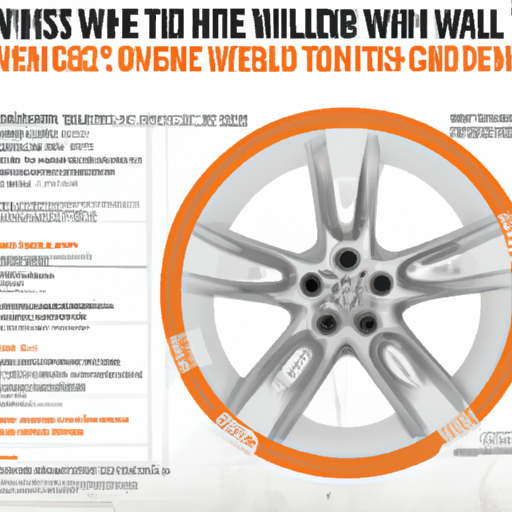Have you ever wondered how much wheels actually weigh? Whether you’re a car enthusiast, a cyclist, or simply curious about the intricacies of everyday objects, understanding the weight of wheels can provide fascinating insights into their design and performance. In this article, we’ll explore the varying weights of wheels, from bicycles to automobiles, and discover how this factor can impact speed, maneuverability, and overall efficiency. Prepare to be surprised by the hidden weight behind your favorite mode of transportation!

Types of Wheels
Steel Wheels
Steel wheels are a common type of wheel that is typically found on older vehicles or lower-end models. These wheels are made entirely of steel and are known for their durability and affordability. However, they tend to be heavier compared to other types of wheels, which can impact vehicle performance.
Aluminum Wheels
Aluminum wheels are lighter and more popular compared to steel wheels. They are made from a combination of aluminum alloys, making them more resistant to corrosion and rust. Aluminum wheels provide better handling and improved fuel efficiency due to their reduced weight. They are also available in a wide range of designs, making them a popular choice for car enthusiasts.
Carbon Fiber Wheels
Carbon fiber wheels are the lightest and most expensive option among the different types of wheels. They are constructed using layers of carbon fiber reinforced with resin, resulting in a strong and lightweight wheel. Carbon fiber wheels offer excellent performance benefits, including enhanced acceleration, braking, and handling. However, their high price point limits their availability to high-performance and luxury vehicles.
Factors Affecting Wheel Weight
Wheel Size
The size of a wheel directly affects its weight. Larger wheels generally weigh more than smaller wheels due to the increased material required for their construction. It’s important to consider the balance between aesthetics and performance when choosing the size of your wheels.
Wheel Width
The width of a wheel also plays a significant role in its weight. Wider wheels tend to be heavier as they require more material. Additionally, wider wheels may affect the vehicle’s handling and stability. It’s crucial to consider the optimal width for your vehicle to maintain proper performance.
Wheel Design
Different wheel designs can vary in weight. More intricate and complex designs often require additional material, resulting in increased weight. On the other hand, simpler and more streamlined designs can be lighter while still providing adequate strength and durability. Consider the design options that align with your performance and aesthetic preferences.
Wheel Material
The material used in constructing the wheels has a direct impact on their weight. As mentioned earlier, steel wheels are typically heavier due to the density of the material. Aluminum wheels offer a lighter alternative, while carbon fiber wheels provide the ultimate weight reduction. Considering the material composition is essential when selecting wheels that best suit your vehicle’s needs.
Average Weight of Different Types of Wheels
Steel Wheels
On average, steel wheels weigh between 20 to 30 pounds (9 to 14 kg) per wheel. These weights can vary depending on the specific size and design of the steel wheel. It’s important to note that the weight of steel wheels can add significant weight to your vehicle, potentially affecting its overall performance.
Aluminum Wheels
Aluminum wheels are generally lighter compared to steel wheels. On average, they weigh between 15 to 20 pounds (7 to 9 kg) per wheel. Aluminum wheels’ reduced weight contributes to improved handling, acceleration, and fuel efficiency, making them a popular choice for many drivers.
Carbon Fiber Wheels
Carbon fiber wheels are the lightest option available, weighing an average of 12 to 15 pounds (5.5 to 7 kg) per wheel. The use of carbon fiber material in their construction allows for exceptional strength while significantly reducing weight. However, it’s crucial to note that carbon fiber wheels are considerably more expensive than other types of wheels.
Weight Comparison Between Steel and Aluminum Wheels
Advantages of Aluminum Wheels
One of the primary advantages of aluminum wheels over steel wheels is their lighter weight. This weight reduction offers several benefits, including improved acceleration and braking performance. The lighter weight also reduces the unsprung mass, allowing the suspension system to work more efficiently, resulting in enhanced ride quality. Additionally, aluminum wheels’ reduced weight contributes to better fuel efficiency, making them a cost-effective choice in the long run.
Advantages of Steel Wheels
While steel wheels may be heavier, they have their own set of advantages. Their strength and durability make them an excellent option for heavy-duty vehicles, such as trucks or off-road vehicles. Steel wheels are also more resistant to dents and damage caused by curbs or potholes, making them a practical choice for rough terrain conditions. Additionally, steel wheels are often more affordable compared to aluminum or carbon fiber wheels, appealing to budget-conscious drivers.

Effects of Wheel Weight on Vehicle Performance
Acceleration
The weight of the wheels influences a vehicle’s acceleration capabilities. Lighter wheels, such as aluminum or carbon fiber wheels, reduce unsprung weight, allowing the engine to exert more power efficiently. This results in improved acceleration and quicker response times. On the other hand, heavier wheels, like steel wheels, can increase inertia and require more energy to get the vehicle moving.
Braking
Wheel weight also affects a vehicle’s braking performance. Lighter wheels have less inertia, allowing the braking system to exert more force on them and bring the vehicle to a stop more effectively. This results in shorter braking distances and improved overall safety. Conversely, heavier wheels may require more braking force and could potentially increase stopping distances.
Suspension
Unsprung weight, which includes the weight of the wheels and components directly attached to them, significantly impacts a vehicle’s suspension system. Lighter wheels reduce unsprung weight, allowing the suspension to more effectively absorb bumps and maintain contact with the road surface. This results in improved handling, enhanced ride comfort, and reduced strain on the suspension components. Heavier wheels, on the other hand, can hinder the suspension’s ability to react quickly and negatively affect overall handling and ride quality.
Fuel Efficiency
Wheel weight plays a role in a vehicle’s fuel efficiency. Lighter wheels, particularly aluminum or carbon fiber wheels, reduce the overall weight of the vehicle, resulting in less energy needed to propel it forward. The reduced weight also decreases the rotational mass, requiring less power from the engine to maintain speed. Consequently, vehicles equipped with lighter wheels tend to have improved fuel efficiency compared to those with heavier wheels.
Implications of Heavy or Light Wheels
Handling and Stability
The weight of your wheels can significantly impact your vehicle’s handling and stability. Lighter wheels, such as aluminum or carbon fiber wheels, contribute to enhanced maneuverability and responsiveness. They allow for quicker changes in direction and improved steering precision. On the other hand, heavier wheels, like steel wheels, can negatively affect handling by increasing the vehicle’s overall weight and inertia, resulting in reduced agility and slower response times.
Ride Quality
The weight of your wheels can also impact the overall ride quality of your vehicle. Lighter wheels, especially those made from aluminum or carbon fiber, reduce unsprung weight, resulting in improved suspension performance. This translates to a smoother and more comfortable ride as the suspension can effectively absorb road imperfections. Conversely, heavier wheels, such as steel wheels, may transmit more vibrations and impacts to the vehicle’s occupants, leading to a less comfortable driving experience.
Vehicle Safety
The weight of your wheels can have implications for your vehicle’s safety. Lighter wheels, particularly aluminum or carbon fiber wheels, contribute to better braking performance by reducing inertia and enabling the brakes to exert more force. This results in shorter stopping distances and improved safety during emergency situations. However, it’s important to note that heavier wheels, like steel wheels, may offer more resistance to damage caused by curbs or potholes, reducing the risk of wheel failure or bending.

Weight Distribution and Balancing
Importance of Balanced Wheels
Balanced wheels are essential for maintaining optimal vehicle performance and safety. Imbalanced wheels can cause vibrations, especially at higher speeds, leading to discomfort for the driver and potential damage to the vehicle’s suspension components. Balancing the wheels ensures that their weight is distributed evenly around the axle, minimizing vibrations and providing a smoother driving experience.
Wheel Balancing Process
Wheel balancing is typically performed using specialized equipment. During the process, weights are strategically placed on the wheel assembly to balance out any uneven weight distribution. This balancing process ensures that the wheels rotate evenly and minimizes vibrations. Regular wheel balancing is recommended when installing new tires or during routine maintenance to maintain a balanced ride.
Ways to Reduce Wheel Weight
Choosing Lightweight Wheels
One of the most effective ways to reduce wheel weight is by selecting lightweight wheels. Aluminum and carbon fiber wheels offer significant weight reductions compared to steel wheels. By reducing unsprung weight, these lighter wheels enhance vehicle performance, improve handling, and increase fuel efficiency. However, it’s essential to consider the trade-off between weight reduction and cost when choosing these premium options.
Wheel Modification
In some cases, it is possible to modify existing wheels to reduce weight. However, these modifications should only be performed by professionals or qualified technicians to ensure structural integrity and safety. Wheel modifications may involve removing excess material, drilling lightening holes, or employing other techniques to achieve weight reduction. However, it’s important to note that modifying wheels can void any warranty and should be done with caution.
Weight Reduction Techniques
Another option to reduce wheel weight is through weight reduction techniques. These methods involve reducing the weight of existing wheels through various means, such as carbon fiber overlays or replacing steel components with lightweight alternatives. While these techniques can provide weight reduction, they may not always be practical or cost-effective, particularly for everyday vehicles.

Common Misconceptions
Heavier Wheels Always Provide Better Traction
Contrary to popular belief, heavier wheels do not guarantee better traction. Traction is primarily determined by the tires, not the weight of the wheels. While heavier wheels may offer improved traction in certain off-road or heavy-duty applications, they can actually hinder traction on paved surfaces due to increased inertia and reduced responsiveness. It’s important to prioritize tire quality and compatibility with the road conditions for optimal traction.
Lighter Wheels Are Always More Expensive
Although carbon fiber wheels are generally more expensive due to their advanced construction materials, it is not always the case that lighter wheels are more expensive. Aluminum wheels, for example, are often more affordable compared to steel wheels due to the lower material cost and production techniques involved. Therefore, it’s important to consider each specific wheel type’s cost and determine the best balance between weight reduction and budget.
Considerations When Choosing Wheel Weight
Driving Conditions
When selecting wheel weight, it’s crucial to consider the driving conditions you typically encounter. If you frequently drive on rough or off-road terrains, heavier wheels, such as steel wheels, may provide better durability and resistance to damage. Lighter wheels, such as aluminum or carbon fiber wheels, are more suitable for smooth and paved road conditions, offering improved handling and fuel efficiency.
Vehicle Usage
The purpose and usage of your vehicle should also inform your choice of wheel weight. If you drive a high-performance or racing car, lighter wheels, such as carbon fiber, may offer significant performance benefits in terms of acceleration, braking, and handling. On the other hand, if you use your vehicle primarily for commuting and everyday driving, the weight reduction provided by aluminum wheels may be sufficient for improved fuel efficiency and comfort.
Budget
Budget is an important consideration when choosing wheel weight. Steel wheels are generally the most affordable option, making them an attractive choice for budget-conscious individuals. Aluminum wheels, while more expensive than steel wheels, offer better performance benefits at a reasonable price point. Carbon fiber wheels, however, come with a significantly higher price tag, appealing to those willing to invest in the ultimate performance and weight reduction.
Aesthetic Preferences
Lastly, your aesthetic preferences should also be taken into account when choosing wheel weight. Different wheel types offer varying designs and finishes that can enhance the appearance of your vehicle. Whether you prefer the classic and rugged look of steel wheels, the sleek and modern design of aluminum wheels, or the high-end and exotic appeal of carbon fiber wheels, there are options available to suit your personal style.
In conclusion, wheel weight plays a crucial role in vehicle performance and should be carefully considered when choosing wheels for your vehicle. The type of wheel, size, width, and material all contribute to the overall weight and can impact acceleration, braking, fuel efficiency, handling, ride quality, and even safety. Balancing the wheels and reducing weight through lightweight wheel options or modification techniques can further enhance performance. Consider your driving conditions, vehicle usage, budget, and aesthetic preferences to make an informed decision and find the perfect wheel weight that aligns with your needs and preferences.


